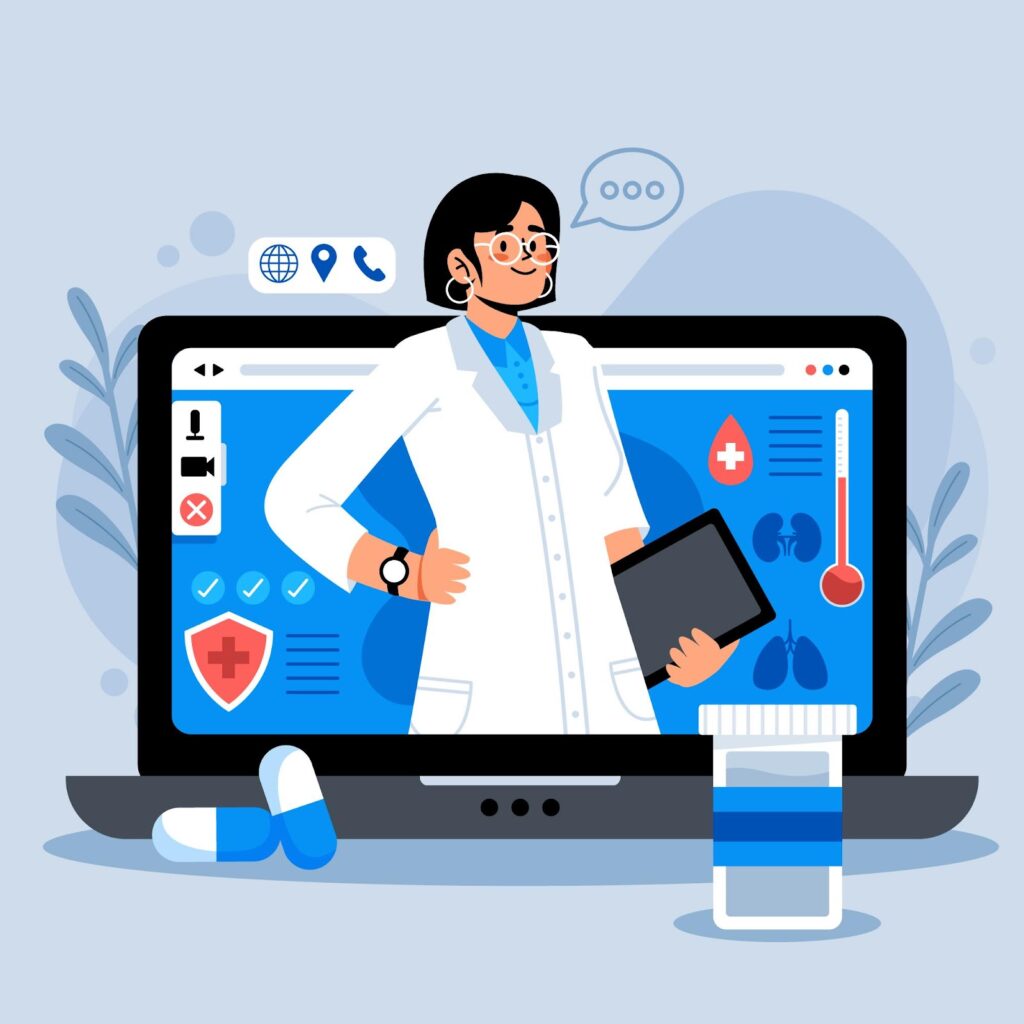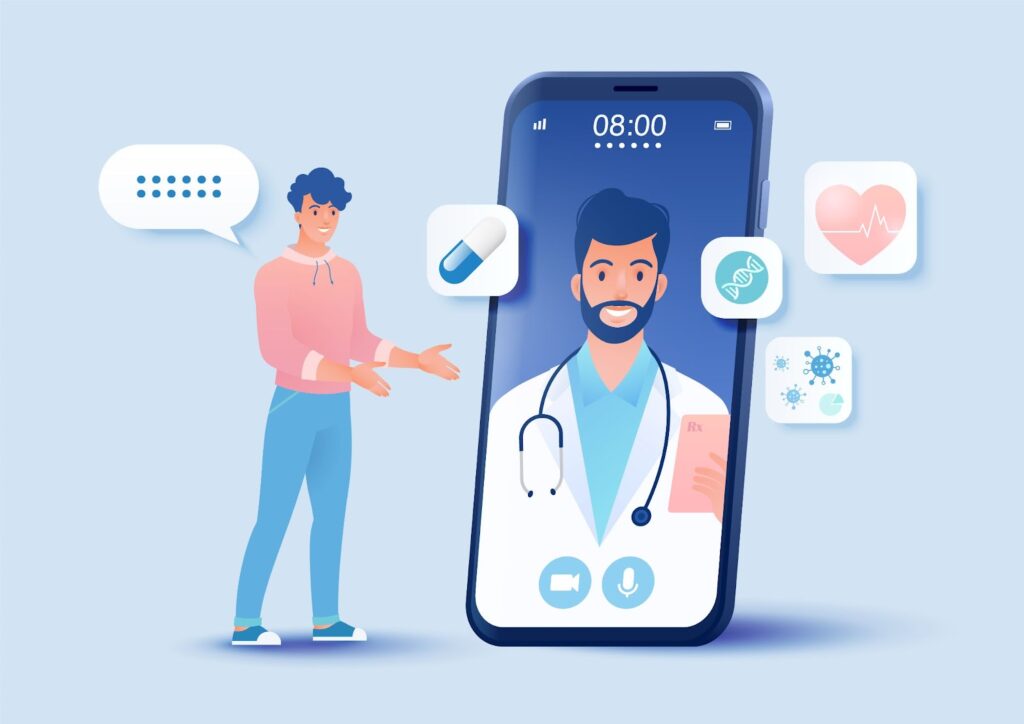It may have been challenging to picture healthcare professionals and patients talking about telehealth and telemedicine software ten years ago. However, telehealth and telemedicine technologies are now welcome to healthcare delivery because of telecommunication technology’s rapid advancements, notably in the healthcare industry. Although people have been using telehealth and telemedicine platforms without hesitation, there are still some common questions among those who want to understand it fully.
So, that’s what our blog is about. We are presenting some of the commonly asked questions about this subject here.
So, let us get started without further adieu.
Common Questions About Telehealth and Telemedicine Software
Here are a few answers to some frequently asked questions that can help you understand the telehealth and telemedicine sector and make a choice in choosing the best software platform for you.
What is the Difference between Telemedicine and Telehealth?
Although the terms “telemedicine” and “telehealth” are usually used interchangeably, they are not the same. Due to its broader range of remote healthcare services than telemedicine, telehealth sets itself apart. While telehealth can apply to distant non-clinical services such as—
- provider training
- administrative meetings
- and continuing medical education in addition to clinical services
—telemedicine is more explicitly used to describe remote clinical services.

What Roles does Telemedicine Play in Medical Care?
Numerous medical disciplines, including—
- Cardiology
- Dermatology
- Psychiatry
- Endocrinology
- and many allied medical specialties, including Sports Rehabilitation and Physiotherapy, Nursing, Diet & Nutrition, etc.
—use telemedicine in areas where access to specialists may be limited.
Additionally, telemedicine is utilized for post-surgery follow-up treatment in several specialities, including
- Orthopedics
- Pulmonology
- Cardiology
- as well as for the management of chronic diseases, such as diabetes, thyroid disorders, mental illnesses, hypertension, etc.
What Varieties of Telemedicine are There?
Asynchronous Telemedicine
This type of telemedicine allows medical professionals to communicate with—
- specialists,
- lab technicians,
- or other doctors
—elsewhere by sending them—
- lab results,
- videos,
- or photographs.
Telemonitoring
This technology enables medical professionals to remotely monitor the vital signs of a patient’s essential health indicators. This telemedicine-based remote form of patient monitoring helps prevent health issues in chronic illnesses or for post-operative treatment and is typically utilized in high-risk or chronic care.
Real-Time Telemedicine
This refers to live video consultations between medical professionals and patients that mimic in-person interactions.
What are the Advantages of Telemedicine?
Based on research from Mordor Intelligence, we can infer that telemedicine is highly popular. In 2018, the telemedicine market was valued at over $38 billion; by 2024, it is projected to reach about $104 billion.
Telemedicine’s Advantages
- Convenient means of following up with patients.
- Permits doctors to consult from anywhere (their homes or offices) without sacrificing the quality of clinical services to patients.
- Patients do not have to be in the waiting room long to see the doctor.
- Scheduling works better for providers, allowing them to spend more time with their families.
- Reduces travel time for patients and enables physicians to meet new patients
- Text messages are more secure than emails.
- Unlike typical video conversations, patient health data is accessible to providers.
- Medical devices, like, Digital stethoscopes, help doctors diagnose patients using telemetry tools like cameras.
- An effective method for keeping track of chronic illness patients.
- Savings for patients and providers alike (Cost-effectiveness of telemedicine in post-traumatic stress disorder)
Is Telehealth or Telemedicine Secure and Legal?
It would be best if you switched to a more secure platform to communicate with your patients via social media and video calling. Make sure your telemedicine services adhere to all required security certifications to protect your business and patients’ interests, like HIPAA-compliant video conferencing. After all, you need to guarantee data protection and provider-patient confidentiality.

What Qualities should Telehealth and Telemedicine Software Have?
Connection for Slow Internet
Consider a choice that doesn’t require very high bandwidth internet connectivity. You or your patient may only sometimes have reliable connectivity; as a result, you should consider this while choosing a software solution.
Provider Scheduling
Some telemedicine applications let patients make appointments. Therefore, it is advised to consider software that enables providers to arrange video sessions and give your employees greater control over your telemedicine calendar.
Support for Online Payments
Find telemedicine companies that integrate online (or mobile) payment options into their telemedicine platform.
EHR Integration
Access to patient’s medical records is essential for making well-informed decisions about their care. For example, you can access patient PHRs (Personal Health Records) during video consultations through reliable software to assist with diagnostic and treatment choices.
Custom Branding
Look into providers who provide telemedicine solutions with your practice’s branding if you want to customize your telemedicine software entirely. For example, patients can find you online or through your mobile app and schedule appointments with you.

What Exactly Does a Telehealth Doctor do?
A doctor who exclusively uses telemedicine platforms or applications for consultations is referred to as a telehealth doctor. Another definition can be a telehealth doctor has incorporated telemedicine into their regular practice.
Are Mobile Applications Necessary for Telemedicine?
A mobile-friendly telemedicine software can increase productivity and encourage patient acceptance due to its convenience. In addition, there is a rising need for telemedicine apps that facilitate connections between patients and physicians.
What is the Setup Cost for Telemedicine?
The setup cost lies in most telemedicine applications’ fundamental equipment: a desktop or laptop computer with a camera, a high-quality microphone, and a subscription fee.
What are Some Examples of Successful Telemedicine Adoption?
Tele-ICU in Hospitals
A University of Massachusetts Memorial Medical Centre study indicated that adopting remote ICU services for health monitoring resulted in
- a 20% decrease in mortality
- a 30% reduction in the time of admission
- and lower expenditures
Telemedicine in Small Practices
Telemedicine has been viewed as a time and money-saving method of following up with doctors in small clinics and medical practices. As it helps them manage their time and maintain a work-life balance, providers are gradually turning to telemedicine instead of
- phone calls
- emails
- and text messages
Nursing
In addition to providing intensive care, telemedicine also makes nurses accessible to patients wherever they may be.
Clinical Studies
The use of telemedicine in clinical trials is growing swiftly due to its potential for clinical intervention and real-time care management. As a result, clinical trial volunteers can now be remotely monitored more efficiently than ever before.
Rural and Related Health Professions
Telemedicine and video conferencing can be quite helpful in fields like rural and related health professions, where access to care is sometimes minimal.

Can I Charge Patients for Using Telemedicine?
It is only fair to get paid for the time spent on telemedicine sessions. You can charge and collect money from patients directly using some telemedicine applications.
What are Your Earnings in Telemedicine?
The benefit of telemedicine applications for your clinic is that they give you the freedom to charge people what you think is fair. This can depend on your area of expertise or the length of the conversation.
Conclusion
The treatment provided by the medium of telehealth and telemedicine software connects patients to essential healthcare services, saves them a significant amount of time, and can even help them receive the care they need faster without having to wait for an appointment or travel across town. It’s no wonder they are growing in popularity. Hopefully, our blog has given you some insightful information to help you make an informed decision- whether that be personal or commercial.

![Common Queries on Telehealth & Telemedicine Software [2022] Common Queries on Telehealth & Telemedicine Software](https://www.durbinhealthtech.com/blog/wp-content/uploads/2022/11/Common-Queries-on-Telehealth-Telemedicine-Software-1-1170x508.png)